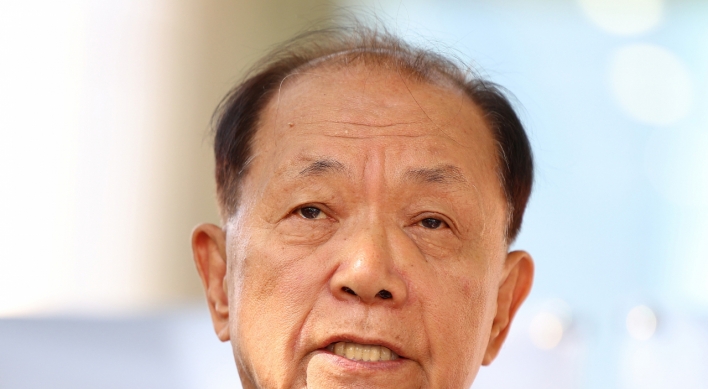[Editorial] Telemedicine row
Ruling party should push for legislation
By Yu Kun-haPublished : Nov. 1, 2013 - 20:02
Smartphones and other mobile devices make it possible for post-surgery outpatients to get routine medical advice from their doctors without visiting the hospital. But they have been denied this convenience because a special interest group representing doctors has scuttled the government’s plan to introduce telemedicine ― the use of information and communication technology in the provision of health care.
Post-surgery outpatients are not the only potential beneficiaries. In many countries in the world, doctors have been remote-monitoring patients with diabetes, heart disease, asthma and other chronic diseases or specific conditions. Physically disabled patients and patients in remote areas also benefit.
But in Korea, such medical services are illegal. This is absurd, to say the least. Moreover, the introduction of telemedicine will help firms that make medical equipment for home care, create jobs and save health institutions money.
The government has attempted to introduce telemedicine on several occasions in the past. But each time it submitted a revision bill to the law on medicine, the National Assembly shelved it under pressure from the Korean Medical Association, a doctors’ lobbying group.
Undeterred by this organized resistance, the Ministry of Health and Welfare said Tuesday that it would push for the revision of the law and introduce in-home care in 2015. In response, the medical association declared an all-out war against the government.
The association, which insisted that telemedicine would “undermine the nature of medicine,” cited the risk of error in diagnosis and treatment as its primary reason for its objection. Indeed, the risk cannot be ruled out.
In addressing this problem, however, the government said it planned to reduce the scope of telemedicine to the treatment of patients with chronic diseases such as hypertension and diabetes, those with long-term psychological disorders, patients recovering at home after surgery, and people on active duty or serving in prison.
Another concern of the medical association is that telemedicine will mostly benefit hospitals, forcing many local clinics out of service. Here again, the government promises to address the association’s concerns. The government says hospitals will be denied the practice of telemedicine except for post-surgery outpatients and patients in the military or correctional facilities.
But excluding other patients from remote medical care cannot be the ultimate solution, though it may ease the conflict between the government and the medical association. What would the government say if those patients complained that they were discriminated against?
Despite all the concessions offered by the government, the medical association still vows to fight the move to introduce telemedicine. Now the question is whether or not the National Assembly, more specifically the ruling party, will overcome mounting pressure from the medical association and pass a government-initiated bill when it is submitted by the end of this year or early next year, as planned.
Insistence on nothing but in-person medical care is incongruous. It is time to move from location-imposed constraints to patient-centered medical services. Not doing so would be sheer folly, and all the more so, given that the necessary technology is now easily available at low cost.
Post-surgery outpatients are not the only potential beneficiaries. In many countries in the world, doctors have been remote-monitoring patients with diabetes, heart disease, asthma and other chronic diseases or specific conditions. Physically disabled patients and patients in remote areas also benefit.
But in Korea, such medical services are illegal. This is absurd, to say the least. Moreover, the introduction of telemedicine will help firms that make medical equipment for home care, create jobs and save health institutions money.
The government has attempted to introduce telemedicine on several occasions in the past. But each time it submitted a revision bill to the law on medicine, the National Assembly shelved it under pressure from the Korean Medical Association, a doctors’ lobbying group.
Undeterred by this organized resistance, the Ministry of Health and Welfare said Tuesday that it would push for the revision of the law and introduce in-home care in 2015. In response, the medical association declared an all-out war against the government.
The association, which insisted that telemedicine would “undermine the nature of medicine,” cited the risk of error in diagnosis and treatment as its primary reason for its objection. Indeed, the risk cannot be ruled out.
In addressing this problem, however, the government said it planned to reduce the scope of telemedicine to the treatment of patients with chronic diseases such as hypertension and diabetes, those with long-term psychological disorders, patients recovering at home after surgery, and people on active duty or serving in prison.
Another concern of the medical association is that telemedicine will mostly benefit hospitals, forcing many local clinics out of service. Here again, the government promises to address the association’s concerns. The government says hospitals will be denied the practice of telemedicine except for post-surgery outpatients and patients in the military or correctional facilities.
But excluding other patients from remote medical care cannot be the ultimate solution, though it may ease the conflict between the government and the medical association. What would the government say if those patients complained that they were discriminated against?
Despite all the concessions offered by the government, the medical association still vows to fight the move to introduce telemedicine. Now the question is whether or not the National Assembly, more specifically the ruling party, will overcome mounting pressure from the medical association and pass a government-initiated bill when it is submitted by the end of this year or early next year, as planned.
Insistence on nothing but in-person medical care is incongruous. It is time to move from location-imposed constraints to patient-centered medical services. Not doing so would be sheer folly, and all the more so, given that the necessary technology is now easily available at low cost.






![[KH Explains] No more 'Michael' at Kakao Games](http://res.heraldm.com/phpwas/restmb_idxmake.php?idx=644&simg=/content/image/2024/04/28/20240428050183_0.jpg&u=20240428180321)










![[Herald Interview] Mistakes turn into blessings in street performance, director says](http://res.heraldm.com/phpwas/restmb_idxmake.php?idx=652&simg=/content/image/2024/04/28/20240428050150_0.jpg&u=20240428174656)
